Who is the real Pharaoh at the time of Exodus? Did Moses influence Akhenaten's Monotheism?
( you may click the following links for extra information)
Ten Plagues For Ten Egyptian Gods and Goddess
The Gods of Egypt & 10 Plagues
New film: “Exodus: Patterns of Evidence”
Introduction:
- The date of the exodus was 1446 BC when Israel left Egypt and 1406 BC when they crossed the Jordan into the promised land.
- The Bible is consistent and clear on this date: 1 Kings 6:1; Judges 11:26; Acts 13:19. The three verses are powerful, convincing and consistent. (* The conventional dates of Solomon's reign are circa 970 to 931 BCE. This puts the date of its construction in the mid-10th century BCE.[34] 1 Kings 9:10 says that it took Solomon 20 years altogether to build the Temple and his royal palace; the Temple itself was completed in 7 years.)
- When Moses killed the Egyptian, he fled to Midian for 40 years from Thutmoses II who was Pharaoh from 1498-1485 BC.
- Thutmoses III was the Pharaoh of the Exodus who reigned 1485 - 1431 BC in three phases. The exodus occurred in Thutmoses III's 18 year of rule after his mother died.
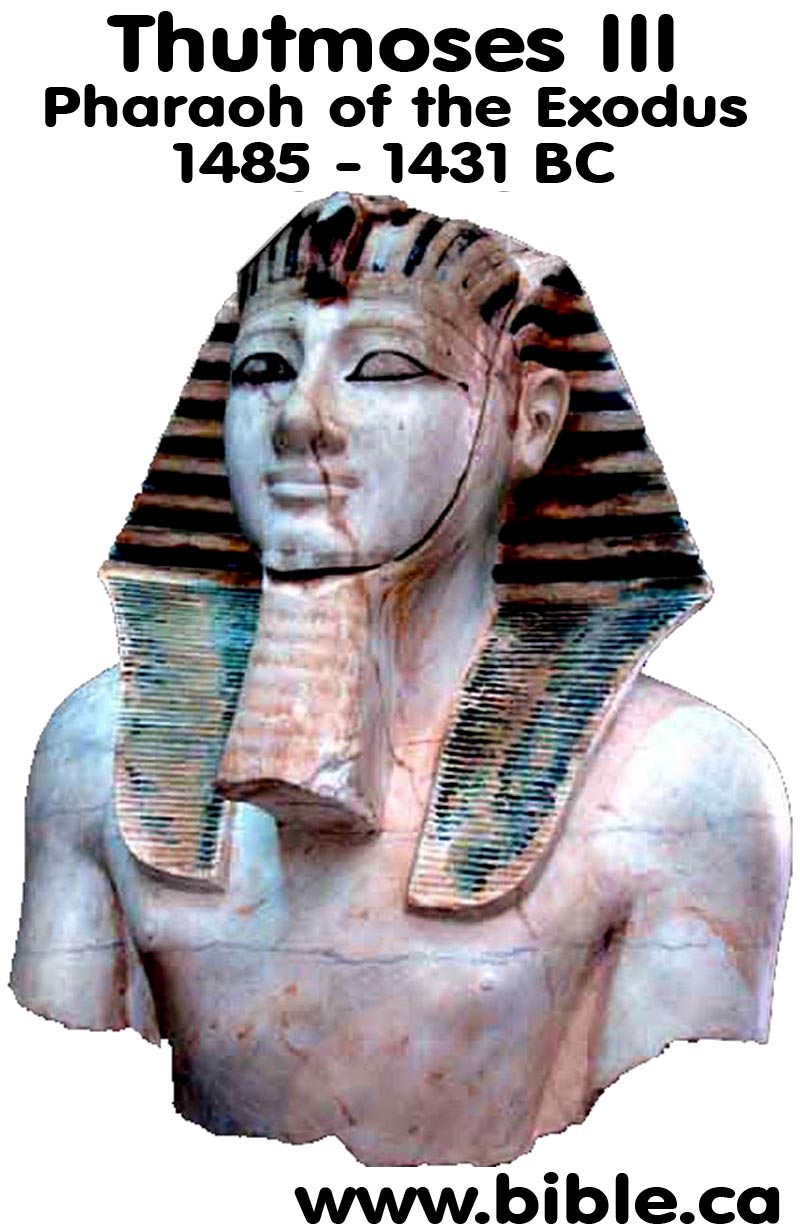
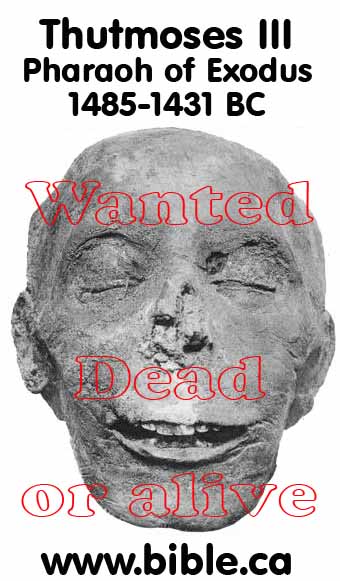
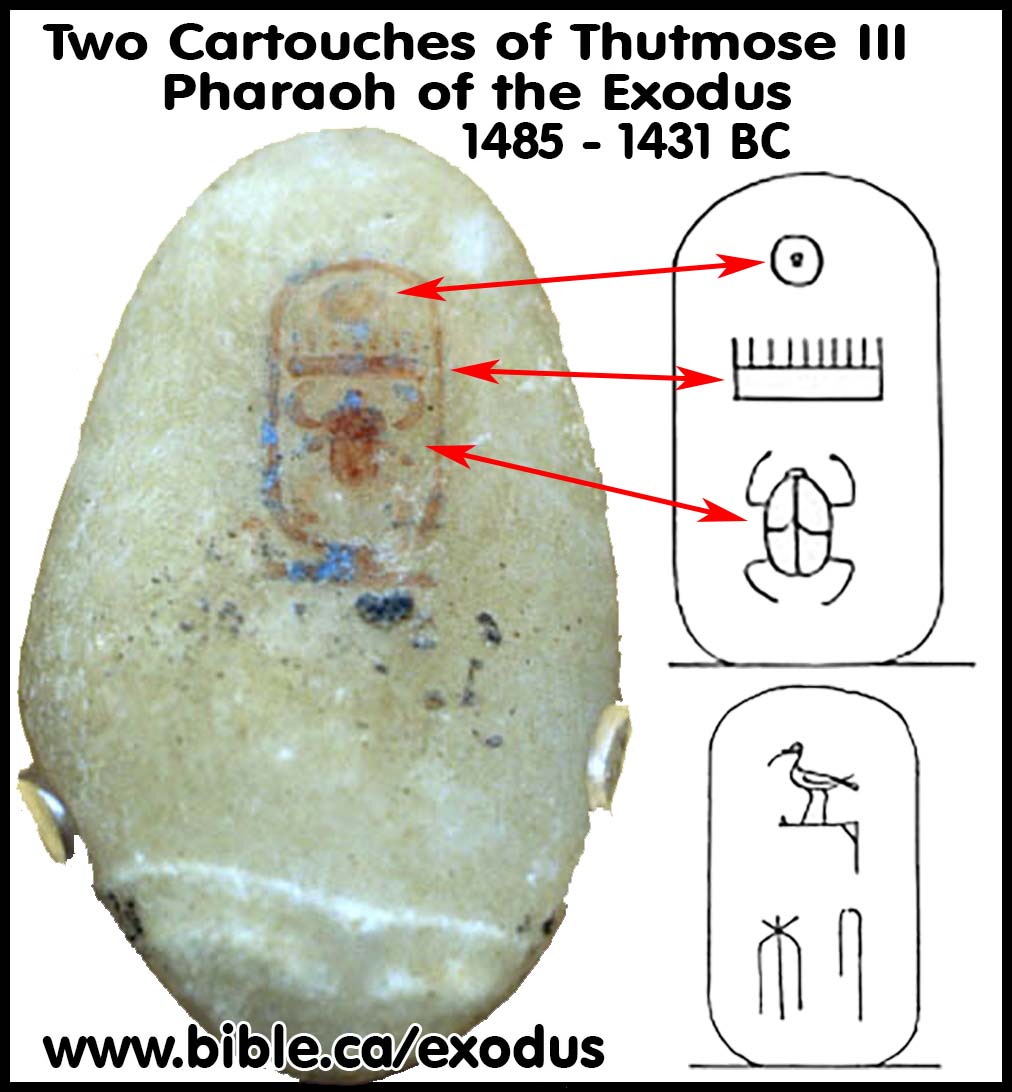
The Date and Pharaoh of the Exodus: 1446 BC
Pharaoh who killed Hebrew children: Amunhotep I: 1532-1511 BC
Pharaoh's Daughter who adopted Moses: Hatshepsut: 1526 BC
Pharaoh of Moses' flight to Midian: Thutmoses II/Hatshepsut: 1498-1485 BC
Pharaoh of the Exodus: Thutmoses III: 1485/1464 - 1431 BC
Pharaoh who killed Hebrew children: Amunhotep I: 1532-1511 BC
Pharaoh's Daughter who adopted Moses: Hatshepsut: 1526 BC
Pharaoh of Moses' flight to Midian: Thutmoses II/Hatshepsut: 1498-1485 BC
Pharaoh of the Exodus: Thutmoses III: 1485/1464 - 1431 BC
Pharaoh of the Exodus: Thutmoses III: (1485-1431)
Thutmoses III was Pharaoh in 1446 BC for a total of 54 years. (1485-1431).
There were three distinct phases to his rule.
1. (1485-1464) First was when he was a baby and his stepmother Hatshepsut ruled as co-regent for 21 years.
2. (1464-1446) Second, after Hatshepsut died, he ruled as Pharaoh for 18 years until the exodus.
3. (1446-1431) Third, he ruled another 15 years after the exodus.
...
1. One of
the most stunning events in religious history is the conversion of Akhenaten to
monotheism in 1358 BC.
2. Akhenaten
became Pharaoh in 1358 BC only 2 years before Joshua died in 1356 BC. He
reigned 17 years and died in 1341 BC.
a. Akhenaten
was very aware of the power of the Hebrew God which demanded monotheistic
worship.
b. As
Pharaoh, he knew how the 10 plagues of Moses had destroyed Egypt.
c. He
would know how the Hebrews had crossed the Red Sea on dry ground through
300-meter-high walls of water on either side, which came crashing down to drown
Egypt's entire military.
d. It was
clear to Akhenaten the monotheistic God of the Hebrews was superior to the
polytheistic pantheon of Egyptian gods.
e. Akhenaten
could clearly see that monotheism was superior to polytheism.
f. Akhenaten
converted to monotheism by worshipping the sun god, "Aten".
3. Akhenaten's
conversion to monotheism (sun worship) is a stunning marker unparalleled in
Egyptian history and only the exodus and conquest can explain it.
( p.s.)Well, I guess you may speculate that Akhenaten's political ambitions could push him to take away powers and wealth from powerful priests of so many gods and goddesses. Yet the price he had to pay to achieve that by revolutionizing traditional religions of Egypt perhaps is too expensive for him to do so. Furthermore, he seemed fully believing in his new Sun disk God. --BH)
On this
stela from El-Amarna, Egyptian King Akhenaten is seen with his wife Nefertiti
and their daughters bearing offerings to the sun-disk Aten.
Conclusion:
- The evidence that Thutmoses III was
the Pharaoh of the exodus is overwhelming. The only other possible
candidate might be Amenhotep II, his son, but he pales against the
towering stature of his father in all ways.
- Pharaoh who killed Hebrew children:
Amunhotep I: 1532-1511 BC
- Pharaoh's Daughter who adopted
Moses: Hatshepsut: 1526 BC
- Pharaoh of Moses' flight to Midian:
Thutmoses II + Hatshepsut: 1498-1485 BC
- Pharaoh of the Exodus: Thutmoses
III: 1485/1464 - 1431 BC
- The Bible is quite clear that the exodus happened in 1446 BC.
- Hatshepsut is "Pharaoh's
daughter" who adopted Moses:
- Hatshepsut, is the only candidate
for the "Pharaoh's daughter" who drew Moses out of the Nile.
- Hatshepsut, is the only candidate
for the "Pharaoh's daughter" who drew Moses out of the Nile.
- Hatshepsut, is the only candidate
for the "Pharaoh's daughter" who drew Moses out of the Nile.
- Born in 1541 BC, she would have
been 15 years old when Moses was born in 1526. Hatshepsut's father was
Thutmoses I and her mother was Queen Amoses.
- Queen Ahmose had four children with
Thutmosis I, but three died young leaving Hatshepsut as the only person
who could wear the title of "Pharaoh's daughter". (Ex 2:7-10;
Acts 7:21; Heb 11:24) The bible says that pharaoh's daughter adopted
Moses out of pity. However, since she was unable to ever bear a son to
Thutmoses II, Moses became her only chance for personal succession. This
all changed when Moses was about 30, when Thutmoses II's second wife
named Iset, bore him a son named Thutmoses III. Remember that Thutmoses
II was Hatshepsut's stepbrother whom she married and jointly raised Moses
to adulthood. Moses was heir apparent, until Thutmoses III was born when Moses
was 30 in 1496 BC. The timing of the birth of Moses and the much later
birth of Thutmoses III is proven by the fact that Thutmoses III was very
young while he was coregent with his stepmother Hatshepsut until she
died.
- Thutmoses II and Hatshepsut the pharaohs
of oppression:
Thutmoses II and Hatshepsut were married stepchildren. Thutmoses II was the Pharaoh of the oppression who wanted to kill Moses who then fled to Midian. At this time, several things came together all in accordance with God's providence. It all started when Moses killed the Egyptian.
- First: Moses was putting his trust in God
and was turning away from the riches of Egypt. (Heb 11)
- Second: a true full blooded "first born
heir" to the throne had been recently been born to Thutmoses II
through his second wife, Iset.
- Third: this placed enormous pressure on the
ambitious Hatshepsut who only had Moses as an adopted "first
born" heir.
- Fourth: there was likely a rivalry with bad
feelings between Iset and Hatshepsut just like Sarah and Hagar.
- Fifth: Moses, like Hatshepsut, could also
"read between the lines" and see that there was an upcoming
power battle over the rightful heir to the throne of Egypt between him
and Thutmoses III. Queen Hatshepsut was furious woman scorned because
"Moses refuses to be called the son of Pharaoh’s daughter (Hatshepsut)Heb 11:24.
Moses insulted and hurt his stepmother by turning his back on everything
she thought was important. In reality, both Thutmoses II and Hatshepsut
were out to kill Moses for different reasons and were both
"Pharaoh's of the oppression". Thutmoses II wanted to kill
Moses to make his biological first-born son, Thutmoses III Pharaoh,
because Moses had legal first right! Hatshepsut wanted to kill Moses out
of vengeful hurt of rejection as a “mother spurned”.
D. Thutmoses III was the Exodus Pharaoh:
- Moses derives his name from the 18th dynasty
not the 19th dynasty of Ramesses.
- "Moses" derives his name from Ahmoses, Thutmoses I and
the "Thutmoses" dynasty of kings. Thutmoses I was
the father of Hatshepsut who named Moses. It is obvious Moses did not get
his name from the 19th dynasty era of Rameses II.
(You may also watch this "Patterns of Evidence-Exodus" in the following link.)
https://tubitv.com/movies/500738/patterns_of_evidence_exodus
(note by BH: secular archaeology likes to reverse the order to think
the monotheism of Akhenaten influenced Moses, you may
decide for yourself which is more likely?)
Biblical Archaeology Review 41:4, July/August 2015
Did Akhenaten’s Monotheism Influence Moses?
(...Defying centuries of traditional worship of the Egyptian pantheon, Egyptian Pharaoh Akhenaten decreed during his reign in the mid-14th century B.C.E. that his subjects were to worship only one god: the sun-disk Aten. Akhenaten is sometimes called the world’s first monotheist. Did his monotheism later influence Moses—and the birth of Israelite monotheism?
In “Did Akhenaten’s Monotheism Influence Moses?” in the July/August 2015 issue of Biblical Archaeology Review, University of California, Santa Barbara, emeritus professor of anthropology Brian Fagan discusses this tantalizing question.
Egyptian King Akhenaten, meaning “Effective for Aten”—his name was originally Amenhotep IV, reigned from about 1352 to 1336 B.C.E. In the fifth year of his reign, he moved the royal residence from Thebes to a new site in Middle Egypt, Akhenaten (“the horizon of Aten,” present-day Tell el-Amarna), and there ordered lavish temples to be built for Aten. Akhenaten claimed to be the only one who had access to Aten, thus making an interceding priesthood unnecessary.)
Brian Wood's discovery about Jericho's falling walls. https://www.youtube.com/watch?v=_EIkkbOZ_Gg
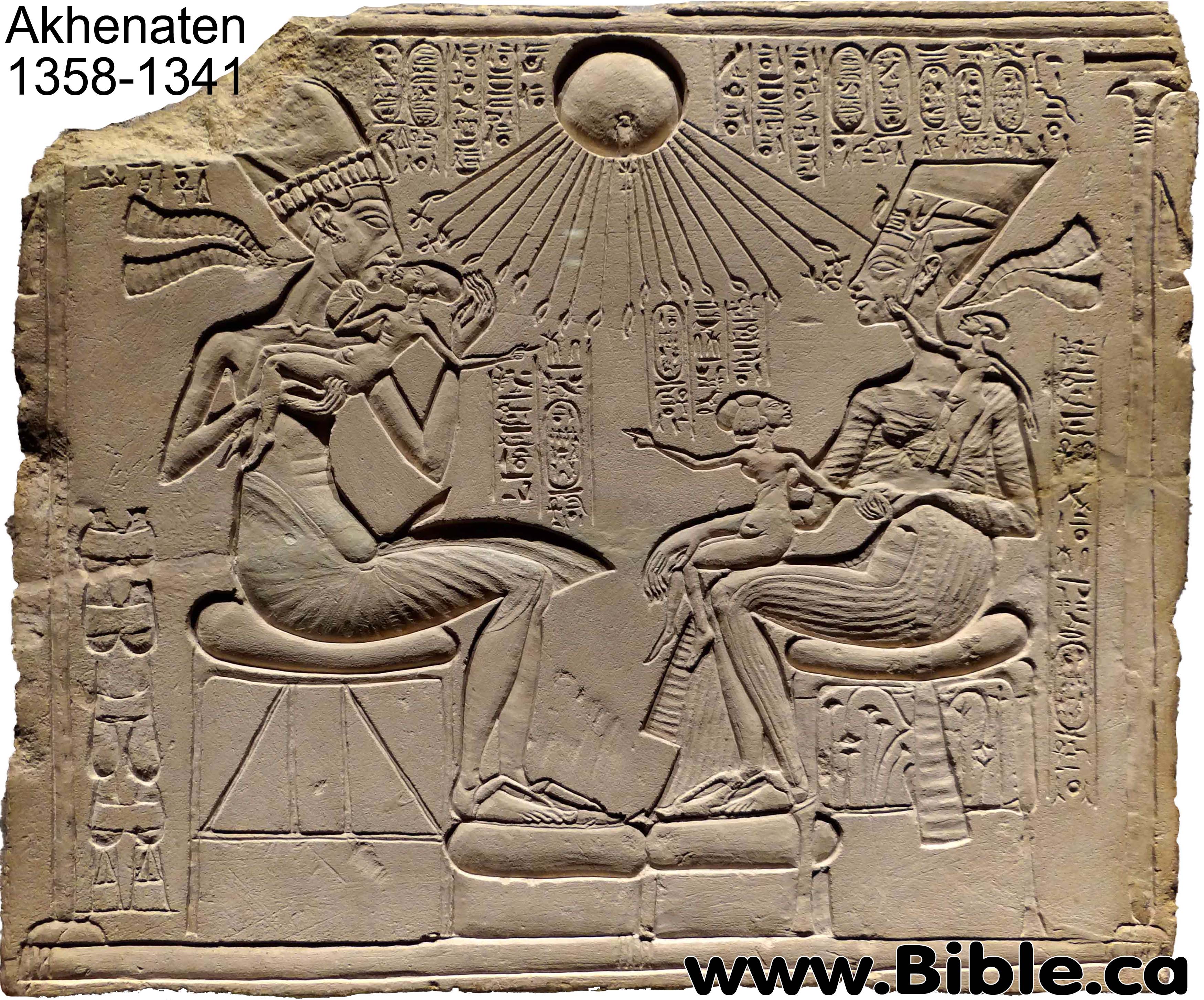


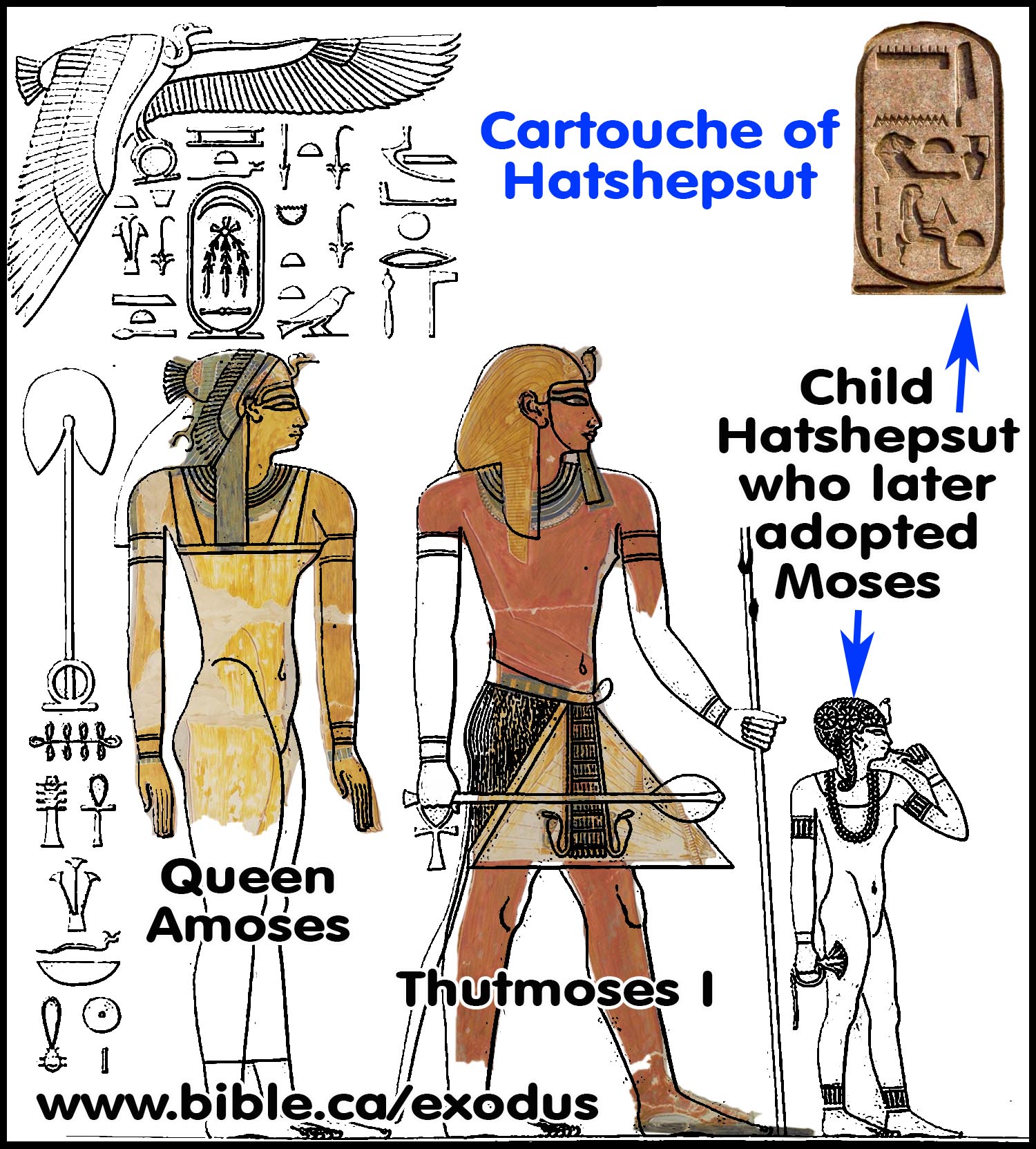
No comments:
Post a Comment